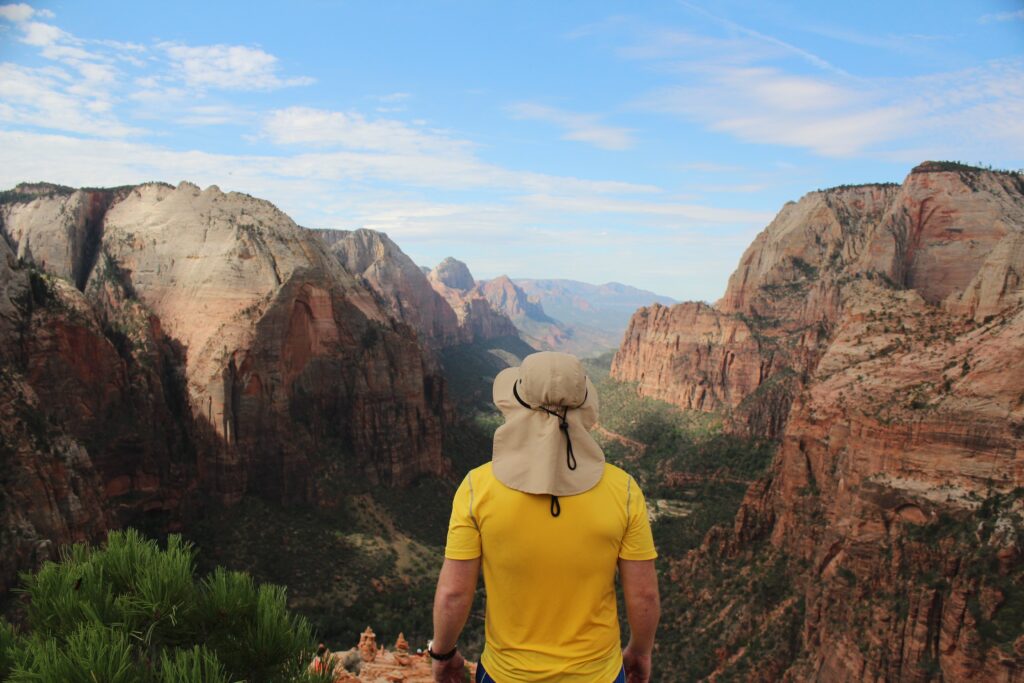
Zion National Park is one of the most beautiful national parks in the United States, attracting millions of visitors each year. With its soaring red rock cliffs, narrow canyons, and winding trails, Zion National Park offers visitors the chance to experience the beauty and grandeur of the American Southwest. In this comprehensive travel guide, we’ll provide you with all the information you need to plan your trip to Zion National Park.
How to Get to Zion National Park
Zion National Park is located in southwestern Utah, approximately 160 miles northeast of Las Vegas, Nevada. The park can be accessed via several major highways, including I-15 and US-89. If you’re flying in, the closest major airport is McCarran International Airport in Las Vegas.
When to Visit Zion National Park
The best time to visit Zion National Park depends on your interests and what you want to see and do. Here are a few things to keep in mind when planning your trip:
- Spring: Spring is a beautiful time to visit Zion National Park, with mild temperatures and stunning wildflowers in bloom. This is a great time to enjoy the park’s hiking trails and outdoor activities.
- Summer: Summer is the busiest season in Zion National Park, with hot temperatures and long days. This is the best time to explore the park’s hiking trails and enjoy outdoor activities.
- Fall: Fall is a quieter time in Zion National Park, with cooler temperatures and beautiful fall foliage. This is a great time to enjoy scenic drives and take in the park’s natural beauty.
- Winter: Winter in Zion National Park can be cold and snowy, but it’s a great time to enjoy winter sports, such as cross-country skiing and snowshoeing. The park is less crowded during the winter months, offering visitors a chance to enjoy the park’s beauty in solitude.
What to See and Do in Zion National Park
Zion National Park offers visitors a wide range of activities and attractions. Here are a few of the park’s must-see sights and experiences:
- Angels Landing: Angels Landing is one of the park’s most popular hikes, offering visitors stunning views of the park’s red rock cliffs and canyons. The hike is challenging, but the views are worth it.
- The Narrows: The Narrows is a popular hike through a narrow canyon with towering walls on either side. Visitors can wade through the Virgin River and experience the park’s beauty up close.
- Scenic Drives: Zion National Park offers visitors several scenic drives, including the Zion Canyon Scenic Drive and the Kolob Canyons Scenic Byway. These drives offer visitors stunning views of the park’s natural beauty.
- Camping: Zion National Park offers several campgrounds for visitors to stay overnight. Reservations are recommended, especially during the busy summer months.
- Wildlife Viewing: Zion National Park is home to a variety of wildlife, including bighorn sheep, mule deer, and coyotes. Visitors can see these animals in their natural habitats throughout the park.
How to Use Your America the Beautiful National Park Pass at Zion National Park
Your America the Beautiful National Park Pass grants you access to all national parks and federal recreation areas that charge an entrance fee:
- Entrance Fees: Without your pass, the entrance fee for Zion National Park is $35 per vehicle or $20 per motorcycle. The pass is valid for 7 days.
- Using Your Pass: Your pass is your entrance permit while visiting the park, allowing you to explore Zion National Park at your leisure.
Additional Considerations for Your Visit to Zion National Park
Here are a few additional things to keep in mind when planning your trip to Zion National Park:
- Shuttle Service: Zion National Park offers a shuttle service that operates during the busy summer months. This provides visitors with access to popular areas of the park without the hassle of driving and parking. The shuttle service is free with park admission.
- Weather: The weather in Zion National Park can be unpredictable. Be prepared for hot temperatures in the summer and cold temperatures in the winter. Please check the forecast and pack accordingly.
- Wildlife Safety: While it can be thrilling to see wildlife up close, it’s important to remember to keep a safe distance. Never approach or feed wild animals, and be sure to store your food and trash properly to avoid attracting bears and other animals.
- Camping: Zion National Park offers several campgrounds for visitors to stay overnight. Reservations are recommended, especially during the busy summer months.
Conclusion
Whether you’re an avid hiker, a nature lover, or just looking to experience the beauty of the American Southwest, Zion National Park has something for everyone. With its stunning red rock formations, winding trails, and abundant wildlife, Zion National Park is a must-see destination for any outdoor enthusiast. By using this comprehensive travel guide, you’ll be able to plan your trip to Zion National Park with ease and make the most of your visit.
